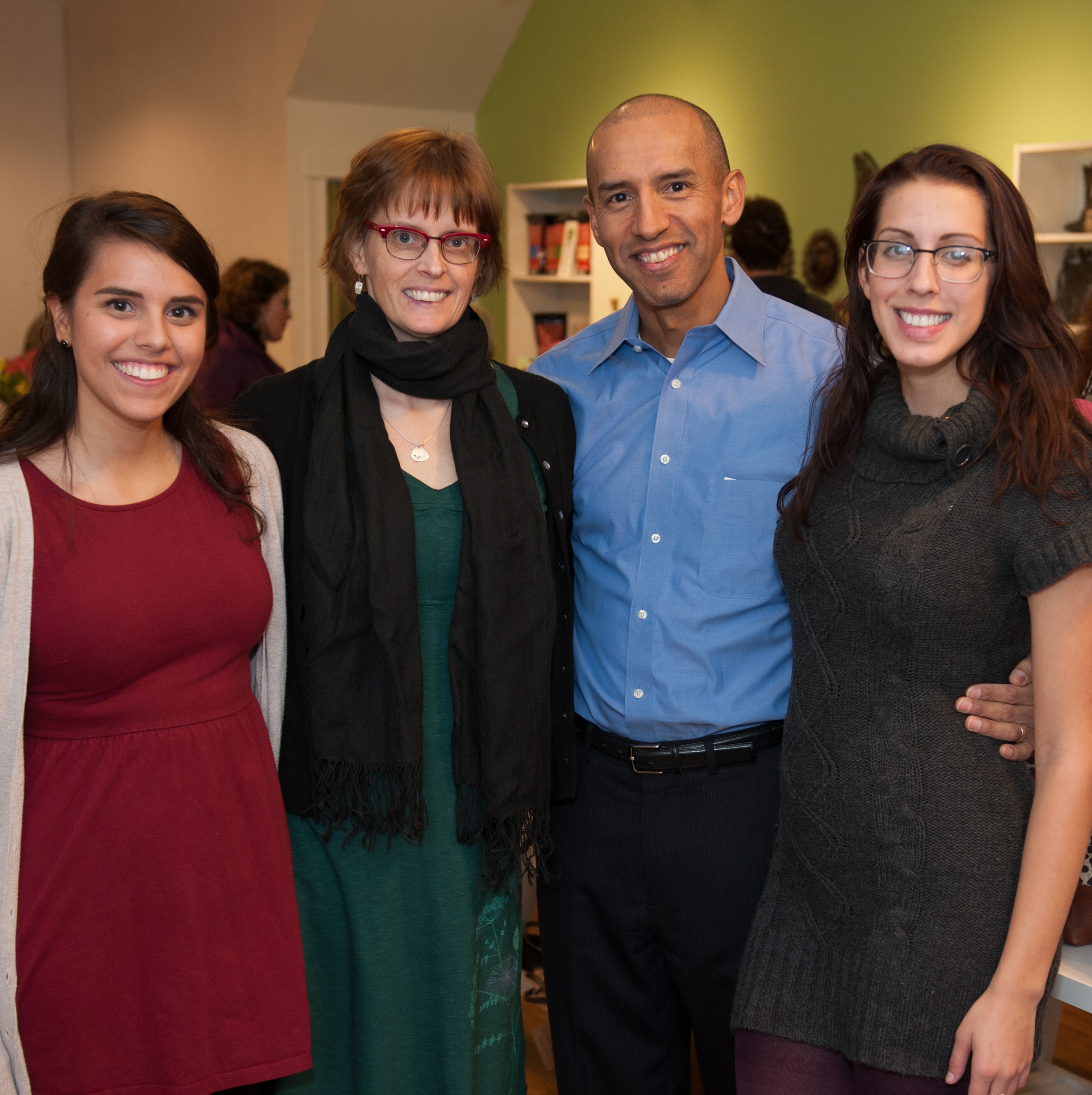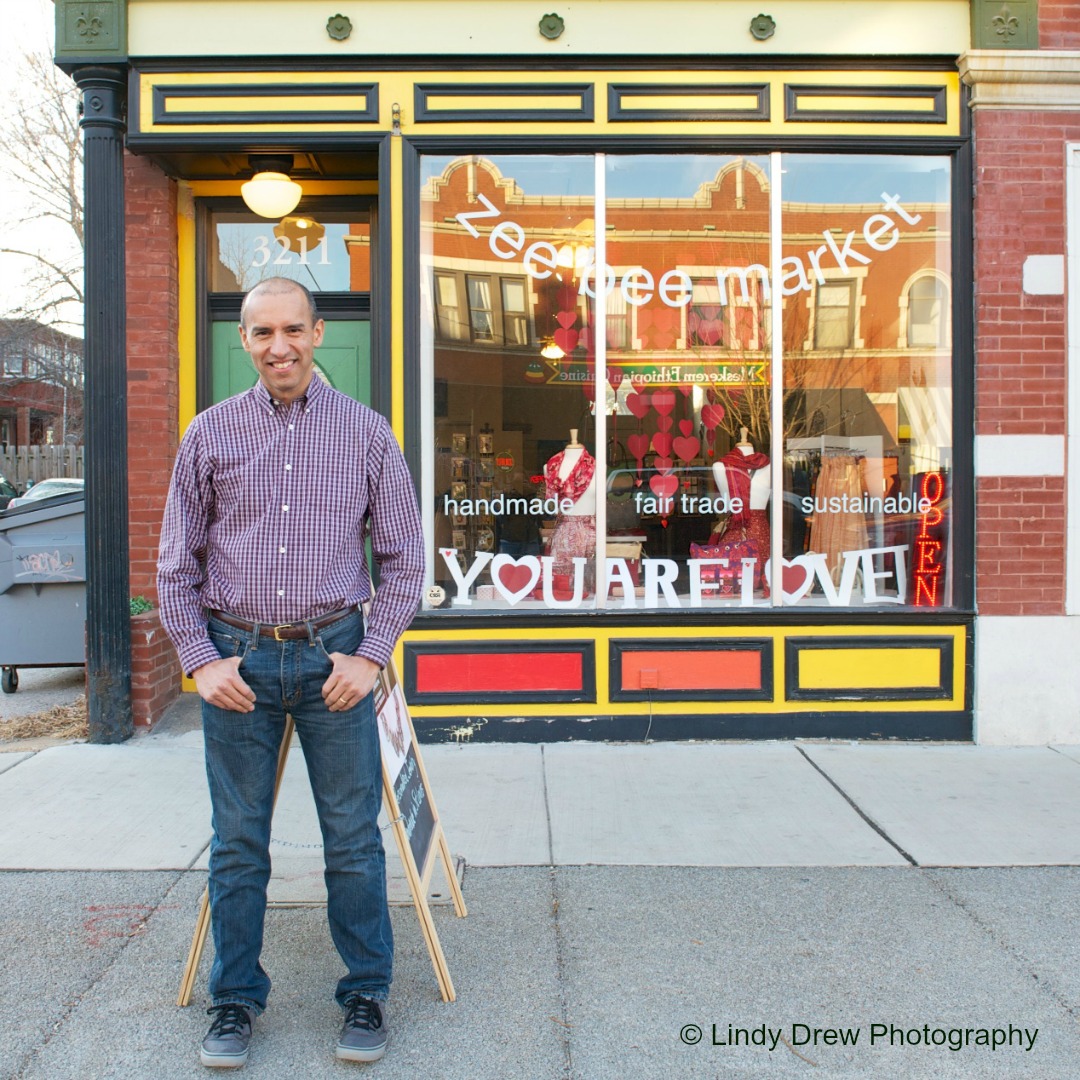
Julio Zegarra-Ballon
 Julio Zegarra-Ballon came to the United States from Peru in 1990, as he saw the U.S. as “truly the land of opportunity.” In 1998, he relocated to St. Louis, and he soon fell in love with the city. He is grateful for all of the opportunities and resources that the city has to offer. “Had I lived in Peru after graduating from college, I would not have been afforded the same resources and possibilities to continue to learn and grow as I found here,” he says.” I built a career in retail and gained invaluable experience in buying, merchandise planning, and marketing. I also completed an MBA at the University of Missouri St. Louis, and my entrepreneurial spirit rose to a new level which helped me launch a business.” His experiences, coupled with the St. Louis environment, provided Julio with the opportunity to open Zee Bee Market, a store offering hand-crafted Fair Trade products from around the world.
Julio Zegarra-Ballon came to the United States from Peru in 1990, as he saw the U.S. as “truly the land of opportunity.” In 1998, he relocated to St. Louis, and he soon fell in love with the city. He is grateful for all of the opportunities and resources that the city has to offer. “Had I lived in Peru after graduating from college, I would not have been afforded the same resources and possibilities to continue to learn and grow as I found here,” he says.” I built a career in retail and gained invaluable experience in buying, merchandise planning, and marketing. I also completed an MBA at the University of Missouri St. Louis, and my entrepreneurial spirit rose to a new level which helped me launch a business.” His experiences, coupled with the St. Louis environment, provided Julio with the opportunity to open Zee Bee Market, a store offering hand-crafted Fair Trade products from around the world.
Julio was inspired to become involved with Fair Trade in 2009 when he connected with Partners for Just Trade, a local organization that works with artisans living in extreme poverty and consumers in North America. Given that many of these artisans were from Peru, Julio felt a personal tie to the initiative, and soon he was volunteering, selling their products, and involved with Fair Trade at the local and national level.
“Fair Trade is a producer-centered supply chain model,” he explains. “It provides workers a fair wage and guarantees healthy, positive and safe work environments. Through Fair Trade, I’m able to provide opportunity to many talented artisans by opening markets for their products here in St. Louis.”
In June of 2012, he started his small business as a mobile retail operation. After a few months of attending farmers markets, events, and festivals around St. Louis, he launched his online store. The response was immediate - people from all over town gravitated to Zee Bee Market and started asking for a storefront.
“The nature of handmade products typically prevents people from ordering online because they know their purchase won’t match the product photo exactly,” he explains. “We carry beautiful products that sell best when the consumer can touch and feel what they are getting. In my business, a website isn’t enough. I don’t have a digital product at the core of my business. That stands out as the world gets more dependent on computers, harvesting big data and automation. I’m investing in people all over the world, their talent, and an experience rooted in the human touch.” These sentiments fueled Julio’s desire to open a brick-and-mortar store.
After doing some research, Julio concluded the thriving South Grand commercial area would be a good home for the store, as the area is already an international restaurant destination, a testament to St. Louis welcoming people from around the world and being a stronger community for it. “Immigrant business owners make this possible,” he says. “Their entrepreneurial spirit prevails despite the language and cultural barriers. St. Louisans appreciate and value products and services that transport them to foreign places without ever leaving home. I’m proud to be an immigrant business owner that connects people in this city with unique, handcrafted products from around the world.”
 The store means much more to Julio than making sales, and he is excited to have the chance to bring Fair Trade to more people in St. Louis. He even printed out beautiful posters that explain the Fair Trade principles so customers can see the impact their purchases make in the lives of countless producers. “It’s about creating a better world,” he says. “It’s about giving talented artists a chance for a better life. With this new store, I can work with more artisans and have a bigger impact on the economies around the world and right here in St. Louis.”
The store means much more to Julio than making sales, and he is excited to have the chance to bring Fair Trade to more people in St. Louis. He even printed out beautiful posters that explain the Fair Trade principles so customers can see the impact their purchases make in the lives of countless producers. “It’s about creating a better world,” he says. “It’s about giving talented artists a chance for a better life. With this new store, I can work with more artisans and have a bigger impact on the economies around the world and right here in St. Louis.”
Julio also extends the Fair Trade philosophy to his employees with the mentality that if he supports Fair supply chain practices that protect artisans, then he should pay a fair wage to his employees. “I believe this creates trust and develops commitment to the employer. I would love to have sales associates who want to stay with Zee Bee Market for years and can share my passion for socially conscious shopping.”
As an entrepreneur and owner of a business, Julio has contributed to the job creation in the area, He currently has three employees, and in the future, he would like to hire a store manager and then have two part-time sales associates.
The story of Julio’s success extends beyond St. Louis. Julio’s story was selected as one of the eleven winning entries to the WE (Welcoming Economies) Global Network’s “A Day in the Life of an Immigrant Entrepreneur” contest, spotlighting immigrant entrepreneurs in midwestern metropolitan regions that play integral roles in their respective local economies and communities. The stories were compiled into a publication, and now circulate across the region to spread their inspiring messages. Julio was also the author to win the contest’s $1,000 grand prize drawing!
Julio attributes his success to the support of his family. His wife has served as a friend, an advisor, and his biggest fan, from giving feedback on the logo selection to choosing paint colors for the store. In addition, his two daughters inspire him to pursue his goals. Marcela, his oldest daughter, has said “I am so inspired by how driven you are Papa, seeing you pursue your own dreams makes me feel like it’s possible for me to also follow mine no matter the circumstances.” “It warms my heart,” he says, “to see my children appreciate hard work as an important factor in making their dreams a reality.”
For Julio, being an entrepreneur is about having the power to build a business that makes a difference and about doing something unexpected. Zee Bee Market does exactly that. He explains that most of the things people buy for everyday life are mass-produced, and customers do not get any say in how they were manufactured or how the people that made them were treated. On the contrary, “Fair Trade items are hand-made, and they stand for equality,” he says. “They stand for dignity, they stand for beauty...my business gives the artisans behind these products a better life.”
